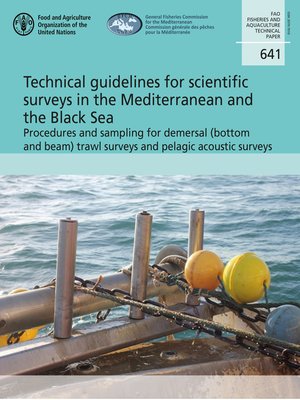Technical Guidelines for Scientific Surveys in the Mediterranean and the Black Sea
ebook ∣ Procedures and Sampling for Demersal (Bottom and Beam) trawl Surveys and Pelagic Acoustic Surveys
By Food and Agriculture Organization of the United Nations

Sign up to save your library
With an OverDrive account, you can save your favorite libraries for at-a-glance information about availability. Find out more about OverDrive accounts.
Find this title in Libby, the library reading app by OverDrive.



Search for a digital library with this title
Title found at these libraries:
| Library Name | Distance |
|---|---|
| Loading... |
In the Mediterranean and the Black Sea, the assessment of demersal stocks mainly relies on scientific surveys (bottom and beam trawl) while the assessment of pelagic stocks is essentially based on acoustic surveys using acoustic techniques with mid-water trawling. These routine surveys-at-sea provide essential information, which in turn are crucial to fine-tune the assessments of the status of resources and to estimate more precisely indicators at the population and fish community levels. However, survey practices differ from one subregion to another, each approach having its own strengths and limitations. In addition, there is still a lack of large-scale standardized surveys aimed at analysing the diversity and distribution of the main demersal and pelagic species across the Mediterranean and the Black Sea. One way of tackling this issue is to carry out international scientific surveys covering the main demersal and pelagic stocks based on a common methodology. The methodology presented in this publication aims at supporting the planning and implementation of regional demersal (bottom and beam) trawl and pelagic acoustic surveys. It can be useful for the implementation of new surveys-at-sea in areas where demersal trawl and pelagic acoustic surveys are not regularly carried out. It can also contribute to increasing comparability between existing surveys thanks to the standardization of methods, sampling of catches and data recording and analysis. Finally, it represents a valuable tool to define minimum requirements towards sustainability and management objectives at the regional and subregional level.







